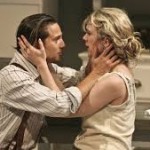 When August Strindberg’s Miss Julie first appeared on the stage in 1888, people were understandably shocked by the author’s unflinching tale about an upper class woman’s affair with a servant and the ensuing power struggle that leads her to take her life.
When August Strindberg’s Miss Julie first appeared on the stage in 1888, people were understandably shocked by the author’s unflinching tale about an upper class woman’s affair with a servant and the ensuing power struggle that leads her to take her life.
Making the play feel as raw to a 21st century audience as it did to theatre-goers in the 19th isn’t easy, especially an audience as awash in “upstairs-downstairs” narratives as our post-Downtown Abbey-inhaling one is.
But Neil LaBute manages to make Strindberg’s masterpiece feel fresh and feral nonetheless. I saw a performance of LaBute’s world premiere adaptation of the play at The Geffen Playhouse in Los Angeles a couple of days ago and I’m still reveling in its raw power.
LaBute manages to keep the audience on its toes by moving the play to 1920s Long Island, just before the stock market crash that lead to the Great Depression. Witnessing the events of the drama unfold in an era that mirrors the precipice-like circumstances in which we live today in this country cuts close to the bone.
The play’s punch also stems from a combination of subtle and not-so-subtle moments of stage action imposed on Strindberg’s text by LaBute.
For example, when Kristine (the excellent Laura Heisler) awakes from a slumber in a nearby chair to the sound of Julie and John audibly having sex in the closet stage left, her feelings are made palpable with a slow walk towards the closet door. Kristine doesn’t open the door, cry or make a scene. She simply sees a pair of open beer bottles on the table, walks towards them with a look of heart-stopping anguish and slowly takes the empties to the sink before quitting the room. It’s a moment of earth-shattering depth and tension, carefully staged and tightly written.
At the other end of the spectrum, we see John (Logan Marshall-Green) take a cloth and gently clean up the blood between Julie’s (Lily Rabe) legs, having just divested his boss’s daughter of her virginity. The discombobulating action is as violent as it is touching. Both actors play the scene in a way that keeps us guessing as to the nature of their feelings. It’s a perplexing mixture of passion, confusion, exhaustion and politics.
The action feels so taut that even everyday sounds, like beer bottle corks being popped, make us (echoing Julie’s jangling nerves) feel unavoidably edgy. And when the master’s bell goes off near the end of the play, the effect is electrifying. John isn’t the only to jump out of his skin and spring into action at the rude but by no means ear-splitting noise; many people in the audience almost leapt out of their seats in shock the night I was at the show.
Director Jo Bonney’s pacey and compressed mise-en-scene demands that the three actors constantly negotiate the space. No one ever has the upper hand for long — neither psychologically, emotionally nor physically. The pressure-cooker feel of the production is further exacerbated by Myung Hee Cho’s scenic design — a cavernous, white 1920s kitchen that seems like it ought to be caked in blood and mud by the end of the play. That this doesn’t actually happen underscores the sense of “business as usual” when the master’s bell rings. Oh, but so much has changed in that kitchen — and beyond.
